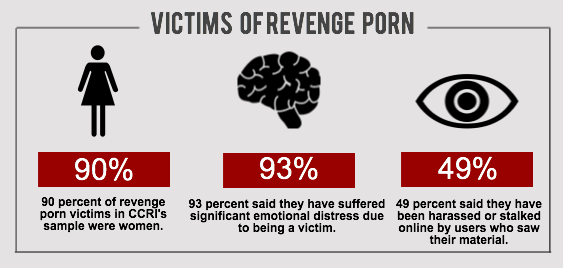REVENGE PORN – PREVENTION & HELP
Social media and smart devices have played a significant role in how our society stays connected since their introduction into our lives in the early 2000s. While the internet and social media has certainly brought forth many positive advancements – making it exponentially easier to communicate, do business, shop, research, read the news, and more – it has also introduced the new and nefarious definition that is cyberbullying.
Today, an influx of cyberbullying and cyber harassment crimes are making news headlines and continues to be an area that requires lawmakers to stay on top of ever-changing social media platforms, websites, blogs, and anonymous forums where online harassment may present itself to unsuspecting victims.
One specific form of cyber harrasment that is causing damage in people’s lives is revenge porn, or nonconsensual pornography. The unlawful use of explicit images without ones’ consent can upheave relationships and ruin careers. Revenge porn may very well be the most embarrassing and shameful downfall of the digital era.If there is a silver lining to this emerging cybercrime, it is that revenge porn is illegal and there are measures to be taken if you should ever become a victim.
What is revenge porn?
By definition revenge porn or revenge pornography is the distribution of sexually explicit images or video of individuals without their permission. The sexually explicit images or video may be made by a partner of an intimate relationship with the knowledge and consent of the subject, or it may be made without his or her knowledge.
These images can include:
- Images taken during the course of an intimate relationship (including images you took of yourself and shared with the intent to keep them
private) - Hidden recordings
- Images stolen from electronic devices (phones, computers, tablets, etc.)
The possession of the material may be used by the perpetrators to blackmail the subjects into performing other sex acts, to coerce them into continuing the relationship, to punish them for ending the relationship, or to silence them.
Who are the victims?
Revenge porn first began grabbing media attention in 2010 when the now convicted felon, Hunter Moore, launched his website IsAnyoneUp. The site allowed users to submit pornography which often included identifying information, such as the victim’s name, place of employment, address and/or social network profile. Activist Charlotte Laws was the first person to bring attention to the website and also one of the first people to publicly support revenge porn victims. Through her advocacy, Laws was one of the first activists to meet with legislators in an effort to get laws passed against revenge porn.
When we look at more specific numbers, nonprofit organization Cyber Civil Rights Initiative conducted a survey to gather information and experiences of revenge porn victims. According to the most recent survey, out of 1,606 respondents from the ages of 18 to 30, 61% (about 980 people) said they had taken nude photos or videos of themselves and shared them with someone else, and 23% of respondents (361 people) had been victims of revenge porn.

Statistics
The Data & Society Research Institute and the Center of Innovative Public Health Research found that 1 in 25 Americans who use the internet has been a victim or posts of posts or threats of nonconsensual pornography sharing.
The report also revealed the following statistics:
- Women are twice as likely to be threatened as men. 1 in 10 young women under 30 has been threatened.
- Young people ages 15–29 most likely to report being threatened by revenge porn sharing.
- Young people 18–29 are mainly the ones that have actually had photos publicly posted of them, men and women are equally likely to have non consensual images posted.
- Most victims come from low-income households.
- People of color are more likely to be victims.
- LGBTQ+ people are at much higher risk than heterosexual people, with 17% of LGBTQ+ internet-users threatened or actually had pictures posted of them.
- 24% of teens 14 to 17 and 33% of young adults 18 to 24 have been involved in some form of nude sexting, which is fuel for nonconsensual pornography.
- 70% of those teens sext with their significant others, with 61% feeling pressured to do it at least once.
HOW TO PREVENT REVENGE PORN FROM HAPPENING TO YOU
| Never share intimate photos | Even if you trust someone, there is still a risk they could post the photos online without your consent. If someone takes an intimate photo of you, ask them to delete it. Never post an intimate photo of yourself online. |
| Avoid taking intimate photos of yourself |
To ensure extra protection of yourself and from online hackers, don’t take intimate or compromising photos of yourself, period. Even if you don’t intend to share them, they could still end up in the wrong hands. |
| Alter your photos | If you do choose to take intimate photos, it is best to take measures to conceal your identity. Use blur tools to omit your face from the picture, and also turn off any geo-tagging options on your device. |
| Talk to your kids about the dangers of sexting |
It may seem like an uncomfortable conversation to have, but discussing the consequences of sharing intimate photos with your children can save them from the dangers and embarrassment of revenge porn down the road. |
Revenge porn in the news
In 2018, reality TV star Rob Kardashian went on a social media rant about his ex-fiancée, Angela Renée White (aka Blac Chyna). Included in the public rant were explicit pictures of her nude body, which Rob did not have consent to share.
Another case of celebrity revenge porn happened in June of 2019 when Hollywood actress Bella Thorne reported a hacker had stolen her cell phone and threatened to post explicit photos of her over social media. Further exacerbating the situation, the hacker allegedly sent her multiple nude photos of other celebrities in addition to her own. Bella took matters into her own hands and posted the hacked photos of herself to her Twitter account, describing the act as a way to reclaim her power and take a stand against the perpetrator.

The federal push to ban revenge porn
Laws against revenge porn have come along way since 2010. Today, 46 states and Washington, D.C. have laws banning revenge porn. The laws, however, vary significantly across state lines with some states classifying revenge porn as a misdemeanor offense and others as a felony (jail time can range from 90 days to 6 years) These existing laws are continuously updated with the advancement of technology; Virginia has banned revenge porn since 2014, and lawmakers recently expanded that law to include “deepfake” porn, or work that has been digitally altered to simulate nude or otherwise explicit images without the victim’s consent.
The push to ban revenge porn on the federal level is in the works. In May, California Congresswoman Jackie Speier and New York Congressman John Katko introduced the SHIELD Act in the House of Representatives, which would make it illegal to “knowingly distribute private intimate visual depictions with reckless disregard for the individual’s lack of consent to the distribution;” California Senator Kamala Harris is planning on introducing companion legislation in the Senate.
What social media channels are doing to combat it
Facebook has turned to Artificial Intelligence to detect and remove ‘non-consensual intimate images’, or revenge porn, in its apps, utilizing advanced machine learning to better identify such content faster, in order to protect victims.
As per Facebook:
“By using machine learning and artificial intelligence, we can now proactively detect near-nude images or videos that are shared without permission on Facebook and Instagram. This means we can find this content before anyone reports it, which is important for two reasons: often victims are afraid of retribution so they are reluctant to report the content themselves, or they are unaware the content has been shared.”
Following suit, other popular social media sites are working to combat revenge porn and improve practices that detect it. For example, Twitter now makes clear that:
“You may not post intimate photos or videos that were taken or distributed without the subject’s consent.”
-and –
“We will immediately and permanently suspend any account that we identify as the original poster of intimate media that was created or shared without consent.”

Know your rights
If you are the victim of revenge porn, you should take immediate action by completing the following steps:
- Report the images to the social media platform where they were posted.
- Take a screenshot of the images and URL.
- File a report with the police.
- Consider hiring a takedown service to remove your images.
There are also some preventable measures you can take to keep dangerous cybercrimes like revenge porn from ever occurring. For instance, switch your Facebook account to private and hide your friend list. Make sure passwords to all your social media and email accounts are complex and unique. And adopt two-step authentication whenever you can.
Can revenge porn be removed?
If someone is spreading nonconsensual images of you online, the specialists at Online Defamation Defenders can fight to have it removed from the Internet. Our firm often GUARANTEES the full removal of your information. Give us a call for a free phone consultation. Once you have signed up for our services, we will immediately begin working to remove the images within 10-21 business days or there will be no charge to you at all.
| Revenge Porn Sites | URL | Removal Cost |
| Shesahomewrecker | https://shesahomewrecker.com/ | $2,500 |
| Cheaterland | https://cheaterland.com/ | $2,500 |
| GossipBlaze | http://gossipblaze.com/ | $1,800 |
| Cheaterboard | https://www.cheaterboard.com/ | $2,000 |
| CheatersandBastards | https://cheatersandbastards.com/ | $2,000 |
| InternetCheaters | https://internetcheaters.com/ | $2,000 |
What are some of the most popular revenge porn websites?
Why should I worry if someone posts images of me on a revenge porn website?
Will anyone be able to see my post on other search engines after it has been removed?
I shared an intimate photo with my boyfriend. Now he’s my ex. Is there anything I can do to ensure he doesn’t post the picture online?
Can I take legal action?
Disclosure
We did not play any part in publishing the existing negative content about you. Additionally, we have no ownership or control over the websites that are hosting the damaging posts about you. However, we are disclosing to you fully that in order to achieve your goal of getting the posts removed we may try and persuade the website owners to remove the content about you either directly or through other third parties. This may involve paying them or an intermediary money.